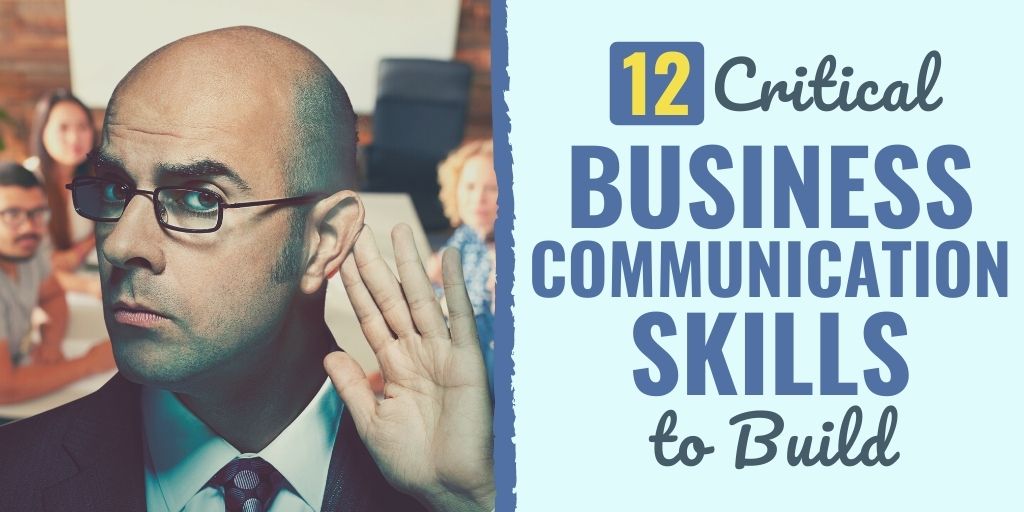There might be affiliate links on this page, which means we get a small commission of anything you buy. As an Amazon Associate we earn from qualifying purchases. Please do your own research before making any online purchase.
Are you looking to improve your workplace skills? First of all, I commend you. Professional development benefits you greatly. It strengthens your confidence and job performance. Also, it can lead to career advancement or salary increases.
Above all, it makes you better at your job, which leads to greater personal satisfaction. So if you're searching for sure fire ways to improve your workplace skills, I suggest you start with these 12 critical business communication skills.
What are Business Communication Skills?
Business communication skills are skills you use to share information at work. This includes information shared within the company or outside the company. This includes communicating upward, downward, or laterally.
You use them to communicate effectively with:
- Other employees
- Supervisors
- Customers
- Vendors
As you can see, any time you communicate information at work, you are using these skills. This includes verbal, nonverbal, or written communication.
Why Are Business Communication Skills Important?
Effective business communication skills make for a stronger workplace. They:
Personal Benefits of Improving Communication Skills
Not only do stronger communication skills help the organization you work for, but they benefit you, as well. As I stated earlier, they prepare you for career advancement.
In addition, improving your communication skills:
- Increase your productivity
- Create more opportunities for learning
- Increase feedback
- Open opportunities for creativity
Anytime you improve a skill, you're participating in personal growth. As part of this growth, you'll learn new things. In turn, you can share these with others, which encourages them to reciprocate. Also, it opens you up to feedback as people comment on your growth.

Finally, knowing more ways to communicate at work provides you with more opportunities to communicate. Therefore, you get to be creative in your communication.
12 Critical Business Communication Skills
It's important that you build up the right business communication skills. Here are 12 skills critical to your success in any workplace environment. By strengthening these skills, you grow professionally no matter where you work.
Skill #1. Active Listening
Active listening requires more than just hearing what the other person is saying. You have to process and understand the message being communicated. Furthermore, you have to respond.
You have to provide feedback to the communicator. Communication is a process. The communicator shares the message. You, as the listener, hears, processes, and responds. Without proper feedback, communication breaks down.
Tips for active listening:
Active listening requires that you listen to learn. Consider the message from the other person's perspective. This will help you build trust. More importantly, it opens you up to other perspectives that you can learn from. Finally, it will keep you from experiencing conflict due to communication breakdown.
Skill #2. Collaboration
Learning to be part of a team includes more than just getting along. You have to learn to accept views different from your own. You have to lay aside your personal preferences for the betterment of the team. This requires compromise and synergy.
Collaboration requires that you work together to achieve the required result. Through the process, you'll grow personally. Whether it's a one-time collaboration or an on-going project, you'll be working with people that have skills you don't. Use teamwork as a learning opportunity.
Plus, promoting the other members of the team won't go unnoticed. It will open you up to more networking opportunities. People want to work with someone that promotes others. You'll find yourself being included in more collaboration projects because you're a team player.
Ultimately, collaboration creates a positive work environment. For example, it increases productivity. That old saying “Two heads are better than one” holds true. You can get more done easily by working as a team.
Remember, when the team wins, everyone wins.
Skill #3. Public Speaking
Whether you're giving a marketing presentation or taking someone's order in a restaurant, you need public speaking skills to communicate at work. Now, the purpose of these skills is not to get noticed. You need these skills so that you share the necessary information effectively.
Moreover, these skills help you be heard. They help you prepare and present your ideas concisely and clearly, whether you're speaking to 1 or 100. This includes informal or formal presentations.
Public speaking skills benefits include:
- Making a connection with your audience
- Developing language fluency
- Strengthening your confidence
- Motivating others to action
Whether you're talking to a customer or another employee, you can use public speaking skills to improve the delivery of your message. In fact, you can use them to influence your supervisor.

Want to ask for a raise? Prepare a presentation on why you have earned a raise and present it to your boss. That's more effective than rambling through just asking them.
People trust somebody that's prepared. It shows you've thought through your message. With public speaking skills, you'll be able to do that.
Skill #4. Writing Skills
No matter the job-field, written communication remains a vital form of communication at work. Whether it's a printed document or a digital copy, there's so many workplace documents you have to fill out.
For example, you may have to complete:
- Time-off Requests
- Incident Reports
- Reports
In fact, even before you get hired, you'll have already completed written documents. You either fill out an application, submit a resume, or a combination of both. Also, don't forget about emails.
Since you use written communication so much at work, it's important that you develop these skills. Improving these skills will help you communicate concretely and concisely so that your message is received. Also, they'll help you improve your professionalism.
Too many people approach workplace written communication informally. Even if you're friends with your coworkers, you're at work. Therefore, your communication needs to remain professional. Incidentally, your written communication can be positive and encouraging while remaining professional.
When it comes to written communication at work, remember:
This even goes for text messages. After all, they are a form of written communication. You might not want an autocorrect fail going out to your boss.
Skill #5. Nonverbal Communication
Nonverbal communication makes up the majority of how we communicate. Some researchers suggest that nonverbal communication makes up 85% of your communication. Plus, nonverbal communication covers so many aspects of communication.
Nonverbal communication includes:
- Body positioning
- Motions
- Eye Movement
- Touch- a high five
- Facial Expressions
- Space
- Sounds- Grunts
- Appearance
- Time Management
As you can see, everything about you communicates nonverbally at work. This includes your views on your appearance and time. For example, going to work in wrinkled clothes and being fifteen minutes late communicates that something has held you up. If I had to guess, I'd say you probably overslept.
Most of us don't even realize our nonverbal cues. Often, our nonverbal cues and verbal communication don't match. Interestingly, studies show that people will believe nonverbal communication over verbal communication. That's why it's important to improve your nonverbal communication.
Therefore, you should set a goal to improve your nonverbal communication.
Skill #6. Emotional Intelligence
Emotional intelligence refers to the ability to perceive, control, and evaluate emotions. Also, it includes being able to interpret and respond appropriately to the emotions of others.
On the job, this equates to thinking before reacting. Your response speaks volumes about you as an employee. For example, stepping back from a situation and choosing an appropriate response instead of acting off of emotions demonstrates self-regulation.

Also, emotional intelligence at work requires empathy. When you're empathetic, you understand another person's situation. You put yourself in their shoes. This allows you to be more inclusive and welcoming.
By managing your own emotional response and being empathetic to others, you'll be able to put other business communication skills to use. For example, emotional intelligence aids in problem-solving and conflict resolution.
Skill #7. Problem-Solving
Problem-solving can be found in every job. You need effective problem solving skills to keep a situation from making you effective at work. For example, anyone that works in customer service uses problem-solving skills to resolve issues that customers have.
Problem-solving demonstrates your ability to deal with difficult situations. By having steps in place to address problems as they arise, you're able to effectively work under pressure. By keeping stress down, you're able to think critically about a solution.
Moreover, problem-solving allows you to utilize your other business communication skills like collaboration or active listening.
To solve a problem, you need to:
Face it. There's always going to be problems at work. While you can't prepare for every problem, you can implement steps for solving a problem. Improving your problem-solving skills ensures that you'll be able to find a solution. Therefore, you can remain productive.
Skill #8. Conflict Resolution
Any time two people communicate, the possibility for conflict exists. Conflict exists because differences exist. Everyone has an open opinion on how things should be done. When opinions clash, conflict results.
While most people want to avoid conflict, this only makes the situation worse. Conflict must be managed if you're going to get past it and reestablish open lines of communication. Thus, conflict resolution remains vital to being productive.
When trying to resolve conflicts at work, remember to:
- Separate the people from the problem
- Don't make it personal
- Address the situation in a neutral setting
- Create a list of solutions
- Work toward consensus
Again, like the other critical business communication skills, to develop conflict resolution skills, you'll need emotional intelligence and active listening.
Skill #9. Networking
Networking involves developing mutually beneficial relationships. It's about building connections. Therefore, it involves meeting new people.
Now, I know that some people have the mentality that they're at work to do their job. They say things like “I'm not here to make friends.” More importantly, their business communication shows it.
While there is an underlying truth to this attitude, it's wrong in other ways. Yes, you're at work to get a job, but you need workplace connections to get that job done. Networking provides you with a safety net at work.
Here are some of the benefits of networking:
- Improves your social well-being
- Allows for the exchange of ideas
- Provides you with resources
- Boost your confidence
Instead of trying to solve a problem by yourself, call upon someone in your network for help. Just be sure to give as much as you get to keep the relationship balanced. Who knows, someone in your network might provide you with a career advancement opportunity some day.
Skill #10. Giving Feedback
Earlier, I said that you need to give feedback as part of the active listening process. To do that, you need to learn how to effectively give feedback . Often, this comes in the form of constructive criticism.
For it to be constructive, it needs to be positive and informative. You can't just tell someone they did something incorrectly. First, you need to appreciate the attempt. Then, show them how to do it correctly.
Remember, feedback fosters growth if given in an appropriate manner. To ensure that your feedback is welcome, ask permission before giving it. Then, state what you observed and explain the impact. Then, offer suggestions for improvement.
If you noticed, I said offer suggestions. Give the other person the option to reject the offer. You're offering feedback as a resource. Approach with the mindset of being helpful.
We all need help at times, but no one likes being treated poorly because of a mistake. By giving feedback in a positive way, you keep the relationship intact. Plus, you respect the dignity of the person you're offering feedback to.
Instead of fault-finding, it becomes a growth opportunity.
Skill #11. Receiving Constructive Criticism
Not only do you need to know how to give positive feedback, you also need to know how to deal with constructive criticism. Everybody gets judged on their job performance. It's a fact of life.
Again, you need to exercise emotional intelligence to keep from reacting negatively. While it may be tempting to lash out, it's not productive. In the end, it doesn't accomplish anything but affect your job performance.
Instead, approach constructive criticism with a growth mindset. Learn from the experience. Actively listen to what is being said and make the necessary adjustments.
This includes asking questions. Find out why you received the criticism. Also, ask for suggestions on how you can improve. Then, thank them for their advice.
If you do this, you'll not only grow from the experience, people will perceive you as someone open to suggestions. More importantly, you will be a person open to suggestions with a growth mindset.
Skill #12. Self- Management
Self-management means having a sense of responsibility for your actions and decisions. This allows you to achieve goals. Also, it demonstrates that you have initiative.
More importantly, it means that your boss doesn't need to constantly look over your shoulder. They can trust you to get the job done. This allows you to set your own pace for the work day. Who better to know your limitations than you?
Self-management involves:
- Setting and keeping goals
- Being organized
- Self-motivation
- Stress management
- Accountability
This requires you to be honest with yourself about your limitations. You have to know your strengths and weaknesses. Finally, you have to be able to address the weaknesses.
Final Thoughts on Business Communication Skills
As you can see, business communications skills go beyond what you say. It also includes how you say it. This includes your emotions and motivation.
By developing these communication skills, you improve your work performance, promote a positive work environment, and positively impact those you communicate with. You benefit and so does everybody else. It's a win-win situation.
For more help with improving your communications skills, check out our 11 Ways to Improve Your Interpersonal Communications Skills. This is a skill that comes in handy throughout all walks of life.


